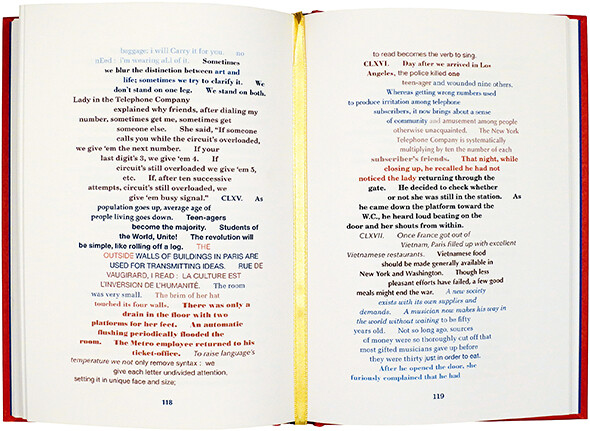September 17–20, 2015
Printed Matter’s NY Art Book Fair
Room C, Table #4
MoMA PS1
Composed over the course of 16 years, John Cage’s Diary: How to Improve the World (You Will Only Make Matters Worse) is one of his most prescient and personal works. A repository of observations, anecdotes, proclivities, obsessions, jokes and koan-like stories, Diary registers Cage’s assessment of the times in which he lived as well as his often uncanny portents about the world we live in today. This beautiful hardcover edition from Siglio collects all eight parts for the first time.
With a great sense of play as well as purpose, Cage traverses vast territory, from the domestic minutiae of everyday life to ideas about how to feed the world. He contemplates the consequences of both unbridled capitalism and an infinite field of information. He excoriates the state and augurs ecological disaster while taking heart in the great capacity for human ingenuity and compassion. A page or two of entries brushes Zen Buddhism with the benefits of legumes, fishing rights with banking in Buttonhole, Ohio, anarchy and revolution with the receipt of a parking ticket, so that the world he is observing is simultaneously intimate and immense.
Diary is populated with his intimates, friends, colleagues—Merce Cunningham, Marcel Duchamp, Buckminster Fuller, Marshall McLuhan, D.T. Suzuki, Norman O. Brown, David Tudor, James Tenney, Jasper Johns. Cage also invokes writers and philosophers like Thoreau, Wittgenstein, and Joyce, creating a prism through which ideas are refracted to open new ways of seeing, engaging—and changing—the world.
Originally typed on an IBM Selectric, Cage used chance operations to determine not only the word count and the application of various typefaces, but also the number of letters per line, the patterns of indentation, and—in the case of Part Three, published as a Great Bear pamphlet by Something Else Press—color. The unusual visual variances on the page become almost musical as language takes on a physical and aural presence.
While Cage used chance operations to expand the possibilities of creating and shaping his work beyond the limitations of individual taste and perspective, Diary nonetheless accumulates into a complex reflection of Cage’s own particular sensibilities as a thinker and citizen of the world, illuminating his social and political awareness, as well as his idealism and sense of humor. The result is an oblique but indelible portrait of one the most influential figures of the 20th century American avant-garde.
Began in 1965, the texts were never published together; instead, they were included in three different volumes published by Wesleyan University Press. Co-editors Richard Kraft and Joe Biel consulted those publications along with Cage’s original (sometimes hand-written) manuscripts, and—with the Great Bear pamphlet as a guide—they used chance operations to render the entire text in various combinations of the original red and blue as well as apply a single set of eighteen fonts to the entire work. In the editors’ note, Kraft and Biel succinctly elucidate the procedure of chance operations and demonstrate its application, giving readers a rare opportunity to see how the text is transformed.
@sigliopress is tweeting an excerpt of Diary every day until October 27 (#JohnCageDiary).
At Printed Matter’s NY Art Book Fair, September 17–20
Diary will be available early in limited quantities at a prepublication discount at Siglio (Room C+Table #04). Or order directly from Siglio and get 25% off until September 30.
Publication date: October 27 / Hardback / 176 pages / duotone illustrations / 32 USD
About Siglio Press
Siglio is an independent press dedicated to publishing uncommon books and editions that live at the intersection of art & literature: inimitable, hybrid works by renowned as well as little known artists and writers that defy categories and thoroughly engage a reader’s intellect and imagination. Artists and writers we publish include Joe Brainard, John Cage, Sophie Calle, Dorothy Iannone, Jess, Ray Johnson, Richard Kraft, and Robert Seydel.

